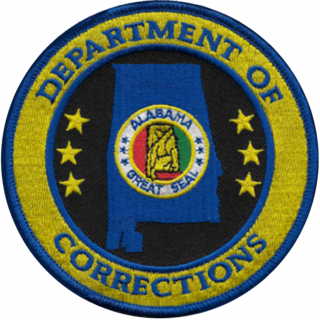
The Eighth Amendment to the United States Constitution protects against imposing excessive bail, excessive fines, or cruel and unusual punishments. This amendment was adopted on December 15, 1791, along with the rest of the United States Bill of Rights. The amendment serves as a limitation upon the federal government to impose unduly harsh penalties on criminal defendants before and after a conviction. This limitation applies equally to the price for obtaining pretrial release and the punishment for crime after conviction. The phrases in this amendment originated in the English Bill of Rights of 1689.

The Arkansas Department of Corrections (DOC), formerly the Arkansas Department of Correction, is the state law enforcement agency that oversees inmates and operates state prisons within the U.S. state of Arkansas. DOC consists of two divisions, the Arkansas Division of Corrections (ADC) and the Arkansas Division of Community Corrections (DCC), as well as the Arkansas Correctional School District. ADC is responsible for housing and rehabilitating people convicted of crimes by the courts of Arkansas. ADC maintains 20 prison facilities for inmates in 12 counties. DCC is responsible for adult parole and probation and offender reentry.
Capital punishment in the state of Washington was abolished on October 11, 2018 when the state Supreme Court ruled it was unconstitutional as applied. On September 10, 2010, Cal Coburn Brown became the last person to be executed in Washington State before it was abolished in 2018.
Turner v. Safley, 482 U.S. 78 (1987), was a U.S. Supreme Court decision involving the constitutionality of two Missouri prison regulations. One of the prisoners' claims related to the fundamental right to marry, and the other related to freedom of speech. The court held that a regulation preventing inmates from marrying without permission violated their constitutional right to marry because it was not logically related to a legitimate penological concern, but a prohibition on inmate-to-inmate correspondence was justified by prison security needs.

Gates v. Collier, 501 F.2d 1291, was a landmark decision of the Fifth Circuit Court of Appeals that brought an end to the trusty system as well as flagrant inmate abuse at Mississippi State Penitentiary, also known as Parchman Farm, in Sunflower County, Mississippi. It was the first case in a body of law developed in the Fifth Circuit Court of Appeals holding that a variety of forms of corporal punishment against prisoners constituted cruel and unusual punishment and a violation of Eighth Amendment rights. This case was also the first broad-scale intervention by a court in the supervision of prison practices.
In United States law, habeas corpus is a recourse challenging the reasons or conditions of a person's detention under color of law. The Guantanamo Bay detention camp is a United States military prison located within Guantanamo Bay Naval Base. A persistent standard of indefinite detention without trial and incidents of torture led the operations of the Guantanamo Bay detention camp to be challenged internationally as an affront to international human rights, and challenged domestically as a violation of the Due Process Clause of the Fifth and Fourteenth amendments of the United States Constitution, including the right of petition for habeas corpus. In 19 February 2002, Guantanamo detainees petitioned in federal court for a writ of habeas corpus to review the legality of their detention.
The "trusty system" was a penitentiary system of discipline and security enforced in parts of the United States until the 1980s, in which designated inmates were given various privileges, abilities, and responsibilities not available to all inmates.
Pervear v. Massachusetts, 72 U.S. 475 (1866), was a case brought before the United States Supreme Court in 1866 over the issue of prisoners' rights. The court ruled that prisoners have no constitutional rights, not even Eighth Amendment rights. This was the first case stating the "hands off" policy that allowed states to run their prisons without federal interference. The application of the Bill of Rights to state action did not come until later and then only in part.

Nutraloaf is food served in prisons in the United States and formerly in Canada to inmates who have misbehaved, for example by assaulting prison guards or fellow prisoners. It is similar to meatloaf in texture, but has a wider variety of ingredients. Prison loaf is usually bland, perhaps even unpleasant, but prison wardens argue that nutraloaf provides enough nutrition to keep prisoners healthy without requiring eating utensils.

Lesbian, gay, bisexual, transgender and queer (LGBTQ) people face difficulties in prison such as increased vulnerability to sexual assault, other kinds of violence, and trouble accessing necessary medical care. While much of the available data on LGBTQ inmates comes from the United States, Amnesty International maintains records of known incidents internationally in which LGBTQ prisoners and those perceived to be lesbian, gay, bisexual or transgender have suffered torture, ill-treatment and violence at the hands of fellow inmates as well as prison officials.

The Alabama Department of Corrections (ADOC) is the agency responsible for incarceration of convicted felons in the state of Alabama in the United States. It is headquartered in the Alabama Criminal Justice Center in Montgomery.

The Prison Litigation Reform Act (PLRA), 42 U.S.C. § 1997e, is a U.S. federal law that was enacted in 1996. Congress enacted PLRA in response to a significant increase in prisoner litigation in the federal courts; the PLRA was designed to decrease the incidence of litigation within the court system.
Plata v. Newsom, Docket No. 4:01-cv-01351-JST, is a federal class action civil rights lawsuit alleging that the California Department of Corrections and Rehabilitation's (CDCR) medical services are inadequate and violate the Eighth Amendment, the Americans with Disabilities Act, and section 504 of the Rehabilitation Act of 1973. As a result of the case, the CDCR's prison medical conditions were found to be in violation of the Eighth Amendment to the United States Constitution. After repeated violations of a stipulated agreement and order for injunctive relief, the CDCR was held in civil contempt and the medical health care system was placed in receivership.
Ruiz v. Estelle, 503 F. Supp. 1265, filed in United States District Court for the Southern District of Texas, eventually became the most far-reaching lawsuit on the conditions of prison incarceration in American history.

Prison food is the term for meals served to prisoners while incarcerated in correctional institutions. While some prisons prepare their own food, many use staff from on-site catering companies. Some prisons support the dietary requirements of specific religions, as well as vegetarianism. Prisoners will typically receive a series of standard meals per day from the prison, but in many prisons they can supplement their diets by purchasing additional foods, including snacks and desserts, at the prison commissary with money earned from working in the prison or sent by family and friends.
Brown v. Plata, 563 U.S. 493 (2011), was a decision by the Supreme Court of the United States holding that a court-mandated population limit was necessary to remedy a violation of prisoners’ Eighth Amendment constitutional rights. Justice Kennedy filed the majority opinion of the 5 to 4 decision, affirming a decision by a three judge panel of the United States District Court for the Eastern and Northern Districts of California which had ordered California to reduce its prison population to 137.5% of design capacity within two years.
Bounds v. Smith, 430 U.S. 817 (1977), was a United States Supreme Court case in which the Court tested the basic constitutional right of prison inmates’ access to legal documents prior to court. Prison authorities would consequently be required to provide legal assistance or counsel to inmates, whether it be through a trained legal professional or access to a legal library. Multiple prisoners alleged that they were denied access to the courts due to lack of an adequate legal library and assistance with court related documents.

In the United States penal system, upwards of 20 percent of state and federal prison inmates and 18 percent of local jail inmates are kept in solitary confinement or another form of restrictive housing at some point during their imprisonment. Solitary confinement generally comes in one of two forms: disciplinary segregation, in which inmates are temporarily placed in solitary confinement as punishment for rulebreaking; and administrative segregation, in which prisoners deemed to be a risk to the safety of other inmates, prison staff, or to themselves are placed in solitary confinement for extended periods of time, often months or years.
In the United States of America, Prisoner Law refers to litigation that determines the freedoms that a prisoner either holds or loses when they are incarcerated. This includes the end of the Hands- Off Doctrine and the ability to be protected by the First, Fourth, Eighth, and Fourteenth Amendments. Furthermore, prisoner laws regulate the ways in which individuals experience privacy in a prison setting. Important case laws have arisen through time that have either hindered or protected prisoners from certain rights. Some include the Hudson v. Palmer case which held that prisoners were not protected against searches and seizures of their prison cells and Wolff v. McDonnell that stated that prisoners shall remain entitled to some of their constitutional rights even after being incarcerated.
Hutto v. Finney, 437 U.S. 678 (1978), is a landmark Supreme Court case against the Arkansas Department of Correction. The litigation lasted almost a decade, from 1969 through 1978. It was the first successful lawsuit filed by an inmate against a correctional institution. The case also clarified the Arkansas prison system's unacceptable punitive measures. Hutto v. Finney was a certiorari to the United States Court of Appeals for the Eighth Circuit.